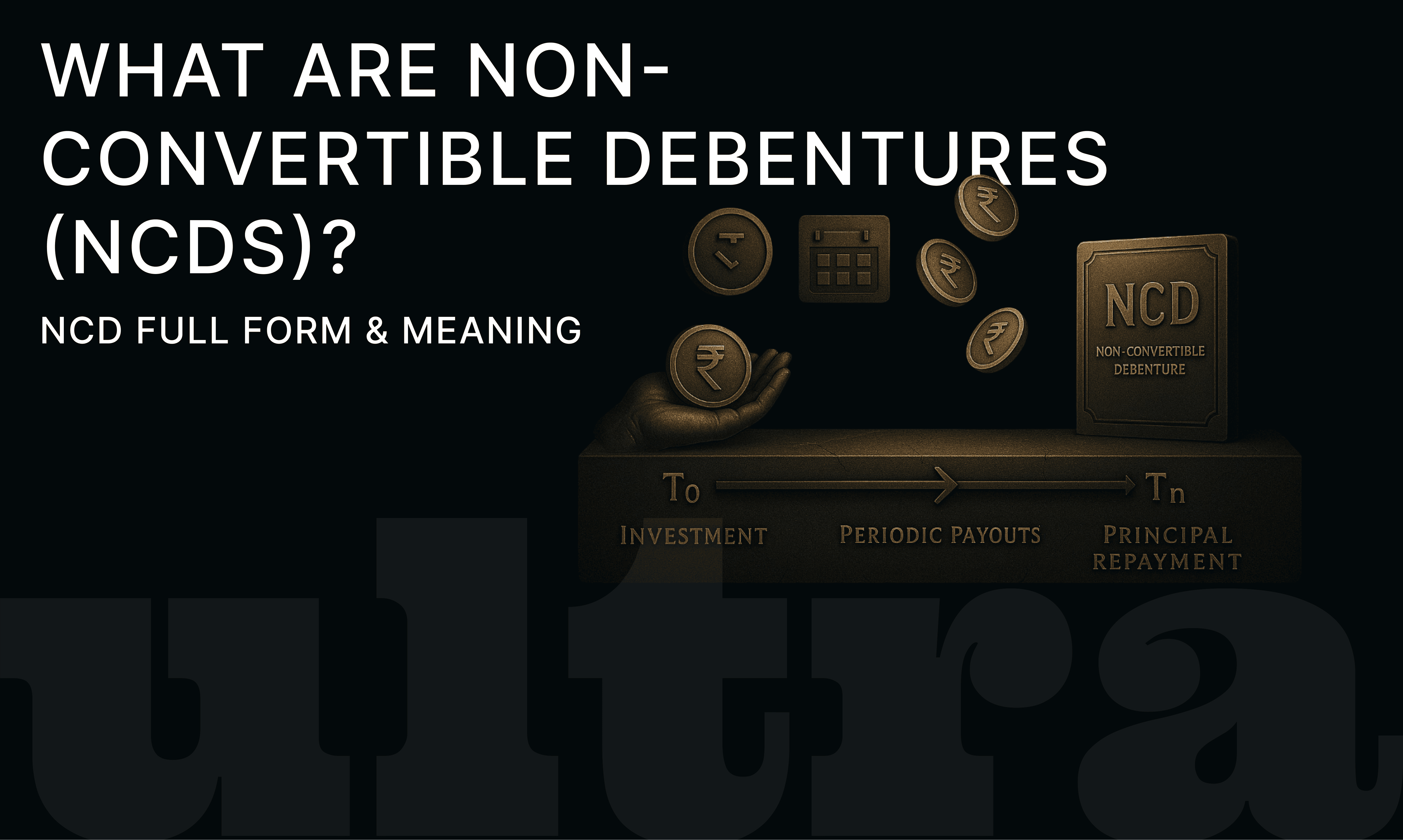What Are Non-Convertible Debentures (NCDs)?
20 June 2025 · Sachin Gadekar
Understanding NCDs: Meaning, Types, Benefits, Risks, and How to Invest in Non-Convertible Debentures in India

NCD Full Form & Meaning
NCD Full Form: Non-Convertible Debentures
What is a Non-Convertible Debenture?
Non-convertible debentures are a type of debt instrument issued by companies to raise capital. Unlike convertible debentures, NCDs cannot be converted into equity shares of the issuing company. They offer fixed interest over a specific tenure and are typically rated by credit agencies based on risk.
Key Features of Non-Convertible Debentures
1. Fixed Returns: NCDs offer fixed interest (coupon rate), generally paid monthly, quarterly, or annually.
2. Tenure: Varies from 1 year to 10 years, depending on the issue.
3. Listed or Unlisted: Some NCDs are listed on stock exchanges like NSE or BSE, ensuring liquidity.
4. Credit Rating: NCDs are rated by CRISIL, ICRA, CARE, etc., indicating their creditworthiness.
5. Secured or Unsecured: Secured NCDs are backed by company assets, while unsecured ones carry higher risk.
6. Taxation: Interest earned is taxed as per the investor’s income tax slab.
Types of Non-Convertible Debentures
1. Secured NCDs
These NCDs are backed by the issuing company’s assets. In case of default, the investor has a legal claim over these assets.
2. Unsecured NCDs
Issued without collateral, these carry a higher risk and hence offer a higher interest rate to compensate investors.
Why Invest in NCDs?
1. Higher Returns than FDs
NCDs usually offer better returns than traditional fixed deposits. For instance, recent NCD issues from NBFCs have provided annual returns between 8% and 10%.
2. Diversification
Adding NCDs to your portfolio can provide stability and reduce exposure to equity market volatility.
3. Regular Income
Ideal for retirees or conservative investors seeking fixed periodic income.
4. Credit-Rated Products
Since NCDs are credit-rated, investors can assess the relative risk before investing.
How to Invest in Non-Convertible Debentures in India
1. Primary Market (IPO of NCDs)
NCDs are often issued via public issues. You can subscribe through online platforms like ICICI Direct, HDFC Securities, or through banks and brokers.
2. Secondary Market
Listed NCDs can be bought or sold via stock exchanges like NSE and BSE. These provide better liquidity and flexibility.
3. Through GetUltra
At Ultra, we help investors discover verified and high-yielding fixed-income investments, including NCD investment options from credible issuers.
Things to Check Before Investing in NCDs
Issuer’s Credit Rating: Prefer ‘AA’ or higher-rated NCDs.
Interest Rate: Evaluate the yield in relation to risk and tenure.
Redemption Terms: Know the lock-in period and maturity timeline.
Liquidity: Listed NCDs offer easier exit options.
Tax Implications: Interest is taxable; plan accordingly.
Top NCDs in India (Recent Listings)
| Issuer | Interest Rate (p.a.) | Rating | Tenure |
|---|---|---|---|
| Muthoot Finance | 9.25% | CRISIL AA+ | 36 months |
| Indiabulls Housing | 9.50% | CARE AA | 60 months |
| Edelweiss Finance | 10.10% | ICRA A+ | 36-60 months |
| NHB Bonds (890NHB34) | 7.64% | AAA | 10 years |
FAQs on Non-Convertible Debentures (NCDs)
Q1. What is the full form of NCD?
NCD stands for Non-Convertible Debentures.
Q2. Are NCDs better than fixed deposits?
NCDs generally offer higher interest rates than FDs but come with slightly higher risk.
Q3. How can I invest in NCDs in India?
You can invest through public issues (primary market), stock exchanges (secondary market), or digital platforms.
Q4. Are NCDs safe?
Secured, high-rated NCDs are considered relatively safe, but investors must check credit ratings and issuer credibility.
Q5. Do NCDs offer monthly income?
Yes, many NCDs offer interest payouts monthly, quarterly, or annually, depending on the issue.